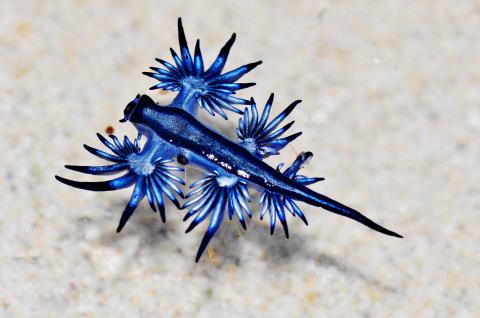The discovery of a distinctive sea slug off Siaoliouciou Island (小琉球) in Pingtung County is shedding light on climate change, a scientist said.
Although Glaucus atlanticus, the only member of the genus Glaucus, is usually found in tropical areas, it had never previously been spotted in Taiwanese waters.
Wang Tien-cheng (王添正), a bed-and-breakfast owner and tour guide, noticed a group of about 60 Glaucus atlanticus near the Duozaiping intertidal zone (肚仔坪潮間帶), while taking some customers on a tour.

Photo: Courtesy of Lo Liu-chih
The 37-year-old Wang also has 11 years of experience guiding underwater snorkeling tours and he often posts pictures of the scenic beauty of the island on his Facebook page.
After giving some of the slugs to Lo Liu-chih (羅柳墀), an assistant professor at National Kaohsiung Normal University’s department of geography, Lo’s research team confirmed that it was the first time Glaucus atlanticus had been seen in the Siaoliouciou area.
Announcing the discovery on Sunday, Lo said that Glaucus atlanticus was first discovered in 1777 by European academics.
Pointing to the slug’s three pairs of symmetrical, protruding hand-like limbs, as well as its vibrant blue tail, Lo said these feature has contributed to the origin of the slug’s name.
The Europeans who discovered the sea slug felt it resembled Glaucus, a fisherman in Greek mythology who after ingesting a magical herb which could bring fish back to life, became immortal and grew fins in place of his arms and legs, according to Roman poet Ovid.
Lo said warming seawater caused by climate change could explain the northward migration of Glaucus atlanticus, but he added that an abundance of Portuguese man-o’-war — the sea slugs favored prey along with velella, a type of jellyfish — in the waters around Siaoliouciou could also account for the presence of the sea slug.
Glaucus atlanticus are immune to the man-o’-war venom and they even have an organ which allows them to store the venom, giving the sea slugs the ability to deal a far stronger sting than the man-o’-war,
Lo warned that any observation of the slug should be done with extreme caution.
Lo also said people should avoid coming into physical contact with the slug and added that Glaucus atlanticus is not edible.
Translated by Jake Chung, staff writer

Nipah virus infection is to be officially listed as a category 5 notifiable infectious disease in Taiwan in March, while clinical treatment guidelines are being formulated, the Centers for Disease Control (CDC) said yesterday. With Nipah infections being reported in other countries and considering its relatively high fatality rate, the centers on Jan. 16 announced that it would be listed as a notifiable infectious disease to bolster the nation’s systematic early warning system and increase public awareness, the CDC said. Bangladesh reported four fatal cases last year in separate districts, with three linked to raw date palm sap consumption, CDC Epidemic Intelligence

The manufacture of the remaining 28 M1A2T Abrams tanks Taiwan purchased from the US has recently been completed, and they are expected to be delivered within the next one to two months, a source said yesterday. The Ministry of National Defense is arranging cargo ships to transport the tanks to Taiwan as soon as possible, said the source, who is familiar with the matter. The estimated arrival time ranges from late this month to early next month, the source said. The 28 Abrams tanks make up the third and final batch of a total of 108 tanks, valued at about NT$40.5 billion

Two Taiwanese prosecutors were questioned by Chinese security personnel at their hotel during a trip to China’s Henan Province this month, the Mainland Affairs Council (MAC) said yesterday. The officers had personal information on the prosecutors, including “when they were assigned to their posts, their work locations and job titles,” MAC Deputy Minister and spokesman Liang Wen-chieh (梁文傑) said. On top of asking about their agencies and positions, the officers also questioned the prosecutors about the Cross-Strait Joint Crime-Fighting and Judicial Mutual Assistance Agreement, a pact that serves as the framework for Taiwan-China cooperation on combating crime and providing judicial assistance, Liang

A group from the Taiwanese Designers in Australia association yesterday represented Taiwan at the Midsumma Pride March in Melbourne. The march, held in the St. Kilda suburb, is the city’s largest LGBTQIA+ parade and the flagship event of the annual Midsumma Festival. It attracted more than 45,000 spectators who supported the 400 groups and 10,000 marchers that participated this year, the association said. Taiwanese Designers said they organized a team to march for Taiwan this year, joining politicians, government agencies, professionals and community organizations in showing support for LGBTQIA+ people and diverse communities. As the first country in Asia to legalize same-sex